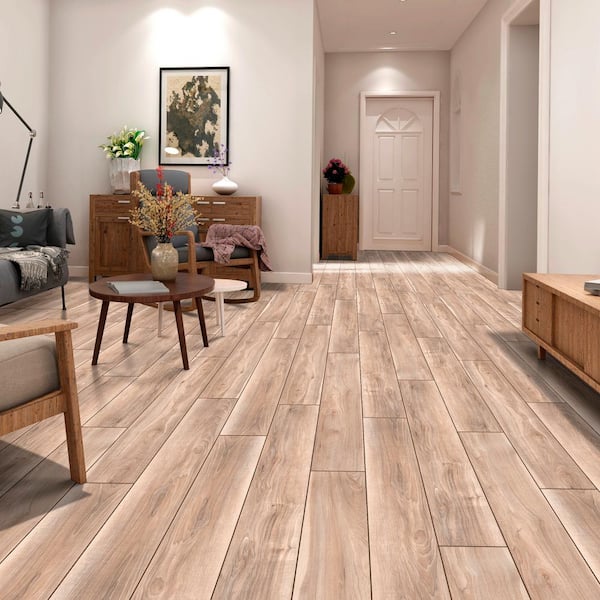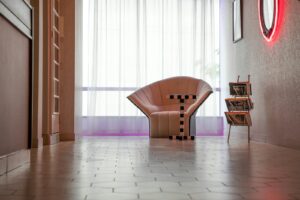Vinyl plank flooring and vinyl sheet flooring both offer durable and versatile options for residential and commercial spaces. Vinyl plank mimics the look of hardwood with individual planks, while vinyl sheet comes in large rolls for seamless installation. Plank flooring offers easier installation and repair of individual planks, while sheet flooring provides a smooth, water-resistant surface with fewer seams. Ultimately, the choice between the two depends on your preferences for appearance, installation ease, and maintenance.
Vinyl Plank vs Vinyl Sheet Flooring
Vinyl plank flooring, also known as luxury vinyl plank (LVP), is designed to mimic the look of hardwood flooring while offering enhanced durability and water resistance. Each plank typically ranges from 4 to 8 inches in width and 36 to 48 inches in length, resembling the dimensions of traditional wood planks. One of the primary advantages of vinyl plank flooring is its realistic wood grain texture and visual appeal, making it an excellent choice for those seeking the aesthetic of hardwood without the high maintenance.
Vinyl sheet flooring also referred to as resilient sheet flooring, is manufactured in large rolls and installed seamlessly to create a smooth and uniform surface. Unlike vinyl plank flooring, which mimics the appearance of hardwood, vinyl sheet flooring offers a broader range of design options, including patterns, colors, and textures. This versatility makes it a popular choice for commercial spaces, healthcare facilities, and high-traffic areas where durability and hygiene are paramount.

Pros of Vinyl Plank Flooring
Resembles Hardwood Flooring: Vinyl plank flooring closely replicates the natural appearance of hardwood, complete with authentic wood grain patterns and textures.
Individual Plank Installation: Unlike traditional hardwood flooring, vinyl plank flooring is installed as individual planks, which can be easily replaced if damaged.
Ease of Installation and Repair: Vinyl plank flooring is typically installed using a click-lock or adhesive method, making the installation process straightforward and suitable for DIY enthusiasts.
Cons of Vinyl Plank Flooring
Potential for Plank Separation: In high-traffic areas or environments with fluctuating temperatures, vinyl plank flooring may experience slight separation between planks over time.
Limited Water Resistance: While vinyl plank flooring is more water-resistant than hardwood, it may not be suitable for areas prone to excessive moisture or standing water.

Pros of Vinyl Sheet Flooring
Seamless Appearance: Vinyl sheet flooring creates a seamless surface without visible seams, making it ideal for large spaces where continuity is desired.
High Water Resistance: The seamless nature of vinyl sheet flooring provides excellent water resistance, making it suitable for kitchens, bathrooms, and other moisture-prone areas.
Low Maintenance: Vinyl sheet flooring requires minimal maintenance, with regular sweeping and occasional mopping sufficient to keep it clean and looking new.
Cons of Vinyl Sheet Flooring
Limited Design Options: While vinyl sheet flooring offers a wide range of design options, including patterns and colors, it may lack the visual realism of vinyl plank flooring.
Challenging Installation for Large Spaces: Installing vinyl sheet flooring can be challenging, especially in large spaces where precise measurements and careful handling are required to achieve a seamless finish.
Key Differences Between Vinyl Plank and Vinyl Sheet Flooring
When comparing vinyl plank and vinyl sheet flooring, several key differences should be considered:
Appearance and Design Flexibility: Vinyl plank flooring resembles hardwood flooring and offers realistic wood grain textures, while vinyl sheet flooring provides a broader range of design options, including patterns and colors.
Installation Process and Difficulty: Vinyl plank flooring is typically easier to install, with individual planks clicked or glued into place, while vinyl sheet flooring requires precise measurements and careful installation to achieve a seamless finish.
Maintenance Requirements: Both vinyl plank and vinyl sheet flooring are relatively low maintenance, but vinyl sheet flooring may be slightly easier to clean due to its seamless surface.
Durability and Water Resistance: Vinyl plank flooring offers enhanced water resistance compared to vinyl sheet flooring, making it a better choice for areas prone to moisture and spills.
Read More
Keep Luxury Vinyl Plank From Fading
Underlayment for vinyl plank flooring on concrete, plywood and hardwood
Pros And Cons Of Sheet Vinyl Flooring
Top Methods to Soundproof Vinyl Flooring: Sound Solutions





